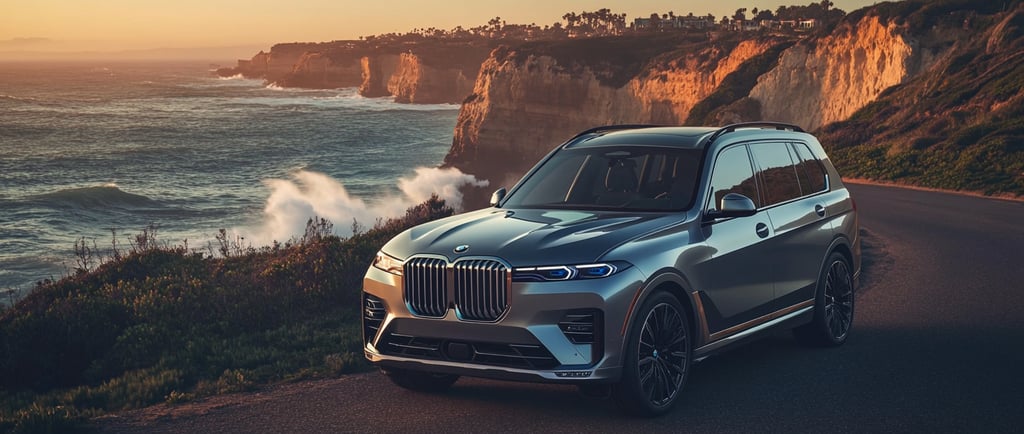Lease vs. Buy: What Smart Luxury Car Shoppers in California Need to Know
Explore the pros and cons of leasing vs buying luxury cars in Southern California with expert insights on BMW, Mercedes, Audi, and more.
6/9/202510 min read


The Strategic Decision: Lease vs Buy a Luxury Car in Southern California
Leasing, which has been the dominant choice in the luxury car segment pre-pandemic, especially with premium brands like BMW, Audi, and Mercedes-Benz, is still a viable option today. However, for affluent car shoppers in Southern California, deciding whether to lease or buy a luxury vehicle requires careful consideration of multiple factors unique to this market and segment.
This article helps you navigate the pros and cons of leasing versus buying luxury vehicles — focusing on popular marques such as BMW, Mercedes-Benz, Audi, and Lexus. Key considerations include:
Budgeting predictability through leasing programs that often bundle maintenance and GAP insurance (notably BMW’s offerings).
Hidden costs tied to ownership, like expensive repairs after warranty expiration due to sophisticated electronics.
Acquisition and disposition fees that apply exclusively to leases.
Potential business tax benefits from leasing for entrepreneurs or consultants.
Brand-specific lease nuances: BMW includes maintenance; Mercedes-Benz and Audi typically require prepaid plans.
Reasons some buyers prefer purchasing for long-term value or freedom from mileage limits.
Choosing the right path aligns closely with your personal goals, timeline, and how much complexity you’re willing to manage. If you're considering an electric vehicle, we also provide insights on whether it's better to lease or buy an EV, which could be beneficial given the rising popularity of electric cars.
Moreover, understanding how residual value impacts vehicle leasing, can also play a crucial role in making informed decisions about car leases.
Trojan Drive, powered by CarOracle, guides you through this luxury car journey with concierge-level insight tailored for Southern California’s elite drivers. We also provide comprehensive data-driven insights on lease vs buy in California for 2025, helping consumers navigate the complexities of their decision-making process.
Leasing a Luxury Vehicle: The Case for Short-Term Ownership
By opting to lease a luxury vehicle in California, you can benefit from budgeting predictability, especially when brands like BMW offer comprehensive packages that cover maintenance and GAP insurance. This ensures that your monthly payments remain stable and predictable throughout the lease term.
One notable advantage of leasing is the inclusion of maintenance and GAP insurance in BMW's standard leasing packages. This not only enhances cost predictability but also eliminates the risk of unexpected repair costs for high-tech infotainment systems and electronics commonly found in luxury vehicles. As a result, lessees can enjoy a hassle-free ownership experience without having to worry about sudden financial burdens related to repairs or maintenance.
The shorter lease terms, usually around three years, are aligned with warranty coverage, providing added peace of mind for lessees. To fully understand and make the most of these [key lease terms](https://www.caroracle.com/article/understanding-the-fine-print-key-lease-terms-explained), it's essential to decode the lease agreement language.
When considering leasing a luxury car in California, these factors play a crucial role in ensuring a smooth and cost-effective ownership experience. With the right lease terms and added benefits like maintenance coverage, leasing can be an attractive option for affluent car shoppers looking for short-term ownership solutions. [Follow these 10 steps to leasing a new car](https://www.edmunds.com/car-leasing/10-steps-to-leasing-a-new-car.html) to ensure you make informed decisions throughout the process.
Hidden Costs You Need to Know About When Leasing a Luxury Car
When it comes to leasing a luxury car, there are some hidden costs that you need to be aware of. These costs can significantly impact your overall expenses and should be factored into your budget. Here are two important fees to keep in mind:
1. Acquisition Fees
Acquisition fees are charged at the beginning of a lease and typically range from $795 to $1,095. These fees cover administrative costs associated with initiating the lease agreement and are non-negotiable expenses that lessees should factor into their budget.
2. Disposition Fees
Disposition fees come into play at the end of a lease term. If you decide not to purchase the vehicle and return it to the leasing company, you may incur disposition fees. These fees usually fall between $350 and $595 and cover the costs of processing the return of the vehicle. It's essential to be aware of these charges when considering leasing as an option.
Understanding these hidden costs is crucial for making an informed decision about whether leasing aligns with your financial goals, especially in comparison to buying a car. Moreover, for certain demographics like retirees, leasing can offer specific advantages such as lower annual mileage concerns and the appeal of driving a new car every few years.
It's also important to remember that leasing a car comes with its own set of responsibilities. For instance, handling accidents with a leased vehicle requires understanding your obligations under the lease agreement. By taking these factors into account, you can better navigate the luxury car leasing process.
When Buying Makes More Sense for Luxury Vehicles
Buying luxury cars in California appeals to affluent shoppers who prioritize long-term ownership and equity building. Unlike leasing, purchasing eliminates recurring acquisition and disposition fees, which can add up significantly over multiple lease cycles. This difference alone can tilt the cost-effectiveness balance in favor of buying, especially if you plan to keep the vehicle beyond five years.
Key advantages of buying include:
Equity accumulation: Ownership allows you to build equity in your luxury vehicle. After several years, you hold an asset that can be traded or sold, unlike leased vehicles which must be returned without any financial stake.
No mileage restrictions: Buying frees you from lease-imposed mileage limits and potential excess mileage charges, critical if you have a high annual driving demand typical of Southern California lifestyles.
Control over modifications: Ownership permits personalization and modifications without violating lease terms.
However, you must also consider the cost of owning a luxury car in California, which includes potential high repair bills after the factory warranty expires. Brands like BMW, Mercedes-Benz, Audi, and Lexus incorporate advanced electronics and infotainment systems that may lead to expensive repairs once coverage ends. This contrasts with leasing programs—such as BMW’s—that often bundle maintenance and GAP insurance to provide budgeting predictability and reduced unexpected expenses.
Business owners or consultants might find leasing more attractive due to possible tax benefits by deducting lease payments as business expenses. Additionally, brand-specific differences affect the decision: BMW’s leases typically include maintenance, whereas Mercedes-Benz and Audi require prepaid maintenance plans purchased separately.
Choosing between buying or leasing hinges on your timeline, tolerance for complexity, and personal priorities. For those committed to long-term use without the constraints of mileage limits or lease-end conditions, buying remains a financially sensible route.
Hidden Costs and Considerations When Owning a Luxury Car
Owning a luxury car can be an exhilarating experience, but it's essential to understand that there are hidden costs involved that go beyond the initial purchase price. These costs can significantly impact your overall ownership experience and financial planning. Here are some key factors to consider:
1. Potentially High Repair Bills After Warranty Expiration
One of the most significant hidden costs of owning a luxury car is the potential for high repair bills once the factory warranty expires. Luxury brands such as BMW, Mercedes-Benz, Audi, and Lexus often come with complex electronics and advanced features that can be costly to repair if something goes wrong.
While the factory warranty may cover most repairs during the initial years of ownership, it's crucial to be prepared for potentially expensive repair bills down the line. As these vehicles age, certain components may require replacement or servicing, which can add up quickly.
2. Depreciation Impact on Resale Value
Another important consideration when owning a luxury car is the impact of depreciation on its resale value. Luxury vehicles tend to depreciate at a faster rate compared to their non-luxury counterparts. This means that when it comes time to sell or trade-in your vehicle, you may not receive as much value as you initially expected.
Interestingly, some luxury cars like Alfa Romeo have been noted for their steep depreciation rates, making them significantly cheaper in the used car market. It's essential to factor in this depreciation impact when planning your finances and deciding whether to keep or sell your luxury car. Researching the historical resale values of similar models can give you a better understanding of what to expect in terms of depreciation.
By being aware of these hidden costs and considerations, you can make more informed decisions about owning a luxury car. It's always a good idea to budget for potential repairs and take into account the long-term value of your vehicle when planning your finances.
Brand-Specific Leasing Nuances That Can Affect Your Decision-Making Process
Different brands have varying approaches to leasing luxury vehicles that can impact your decision-making process.
BMW: Maintenance Included with Lease
BMW stands out by including maintenance as part of their standard leasing packages. This means lessees enjoy the convenience of having maintenance costs covered within their lease agreement.
Mercedes-Benz and Audi: Prepaid Maintenance Plans Required
In contrast, Mercedes-Benz and Audi require lessees to purchase prepaid maintenance plans separately. This adds an extra layer of cost and complexity for lessees who opt for these brands.
The inclusion of maintenance within the lease package by BMW can be a significant advantage for those seeking a hassle-free ownership experience without worrying about additional service costs.
Despite the convenience offered by BMW's maintenance inclusion, some buyers may still prefer purchasing over leasing due to long-term cost considerations, autonomy in vehicle modifications, and avoiding mileage restrictions.
Additional Factors Affluent Buyers Should Consider Beyond Price Tag Alone
This article should help affluent car shoppers in Southern California understand the pros and cons of leasing versus buying a luxury vehicle — especially brands like BMW, Mercedes-Benz, Audi, and Lexus.
1. Budgeting Predictability of Leasing
Leasing can offer budgeting predictability, as monthly payments are typically lower compared to financing a purchase. This can be particularly advantageous for those who prefer to allocate their funds towards other investments or experiences. Additionally, certain brands like BMW include maintenance and GAP insurance in their leasing packages, providing enhanced cost predictability and peace of mind.
2. Hidden Costs of Ownership When Buying
While owning a luxury vehicle may seem appealing, it's important to consider the hidden costs associated with ownership. As the owner, you will be responsible for all maintenance and repair expenses once the warranty expires. This can be a significant financial burden, especially for vehicles with complex electronics that may require expensive repairs. By understanding these potential costs upfront, you can make a more informed decision about whether buying is truly the best option for you.
3. Acquisition and Disposition Fees
When comparing leasing and buying, it's crucial to take into account any fees that may apply to leases but not purchases. For example, many lease agreements come with acquisition fees (charged at the beginning of the lease) and disposition fees (charged at the end of the lease). These additional costs can impact your overall cost comparison between leasing and buying, so it's essential to factor them into your calculations.
4. Business Tax Benefits
If you're an entrepreneur or consultant using your luxury vehicle for business purposes, leasing may offer certain tax advantages that could benefit your financial situation. In some cases, you may be able to deduct a portion of your lease payments as a business expense on your taxes. However, it's important to consult with a tax professional to fully understand how these benefits apply to your specific circumstances.
5. Brand Approach Differences
Each luxury brand has its own unique approach when it comes to leasing terms and conditions. For example, BMW may offer more flexible mileage limits compared to Mercedes-Benz or Audi. Understanding these differences can influence your decision-making process and help you choose the brand that aligns best with your lifestyle and driving habits.
6. Preference for Purchasing
While leasing offers its own set of advantages, there are still some buyers who prefer ownership over leasing. This preference may stem from factors such as long-term use plans (e.g., keeping the vehicle for several years) or flexibility on mileage limits (e.g., not wanting restrictions on how far you can drive). It's important to honestly assess your needs and preferences before making a final decision.
By considering these additional factors alongside price tag alone, you'll gain a more comprehensive understanding of what it means to lease versus buy a luxury vehicle in Southern California's competitive market.
Conclusion
There is no definitive answer to the age-old question of whether to lease or buy a luxury vehicle in Southern California. Your decision should be based on your unique preferences, goals, and financial situation.
Leasing offers budgeting predictability, especially with brands like BMW that include maintenance and GAP insurance. However, hidden costs like high repair bills after warranty expiration can catch buyers off guard.
Buying may be more cost-effective in the long run, as you build equity and avoid recurring acquisition and disposition fees. Consider your ownership timeline and desire for control over modifications.
Business owners might find leasing appealing due to tax benefits, while brand-specific nuances like maintenance inclusions can sway your decision.
Ultimately, weigh the pros and cons carefully before making your choice between leasing or buying a luxury car in Southern California.
FAQs (Frequently Asked Questions)
What are the main advantages of leasing a luxury car like BMW in Southern California?
Leasing a luxury car such as a BMW in Southern California offers budgeting predictability with typically shorter lease terms around three years that align with warranty coverage. BMW leases often include maintenance and GAP insurance, reducing unexpected repair costs, especially for high-tech electronics. Leasing also provides business tax benefits for entrepreneurs or consultants and mitigates risks related to warranty expiration.
What hidden costs should I be aware of when leasing a luxury vehicle in Southern California?
When leasing a luxury car, you should consider acquisition fees ranging from $795 to $1,095 charged at lease initiation and disposition fees between $350 and $595 applied at lease end if you return the vehicle instead of purchasing it. Additionally, brands like Mercedes-Benz and Audi may require prepaid maintenance plans, unlike BMW which includes maintenance in their leases.
Why might buying a luxury car be more beneficial than leasing for some buyers?
Buying a luxury vehicle can be more cost-effective for long-term ownership beyond five years since there are no recurring acquisition or disposition fees. Owners build equity in the vehicle over time and avoid mileage limits commonly imposed on leases. Buying also allows more flexibility without concerns about excess wear or penalties associated with leased vehicles.
How do maintenance plans differ among luxury brands when leasing in Southern California?
BMW includes maintenance and GAP insurance as part of their standard leasing packages, enhancing cost predictability. In contrast, Mercedes-Benz and Audi typically require lessees to purchase prepaid maintenance plans separately. This difference can influence your decision depending on how much value you place on inclusive maintenance coverage during the lease term.
What are some hidden costs associated with owning a luxury car after the warranty expires?
After the factory warranty expires, owners may face high repair bills due to complex electronics prevalent in brands like BMW, Mercedes-Benz, Audi, and Lexus. Depreciation also significantly impacts resale value, so factoring these costs into your long-term ownership budget is essential when considering buying versus leasing.
Are there specific business tax benefits that make leasing luxury cars attractive for entrepreneurs in Southern California?
Yes, leasing luxury vehicles can offer favorable business tax benefits for entrepreneurs and consultants by allowing them to deduct lease payments as business expenses. This advantage can improve cash flow management and reduce taxable income compared to purchasing, making leasing an attractive option for business owners seeking financial efficiency.

Contact Us
hello@TrojanDrive.com
© 2025. CarOracle LLC DBA TrojanDrive. All rights reserved.


TrojanDrive is a brand of CarOracle LLC, providing expert auto buying services for luxury brands across California.
